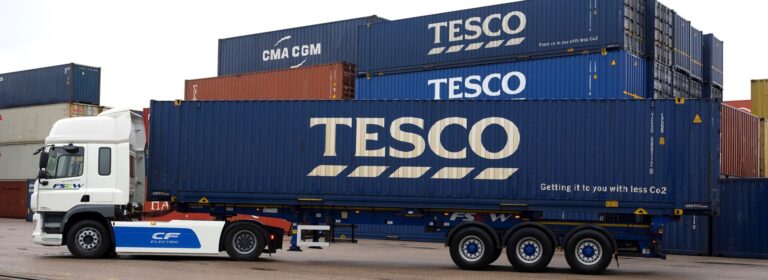Following on from its news last month of increasing its use of rail freight, supermarket leader Tesco is starting the new year on the right footing for the planet with the launch of what it claims is the UK’s first commercially used fully electric heavy freight articulated trucks.
Two new 37-tonne DAF electric vehicles will transport food and other products from Wentloog rail terminal outside Cardiff to Tesco’s DC in Magor, Wales, in partnership with logistics and international freight forwarding company, FSEW.
“Our distribution network is one of the largest in the UK and plays an important role in our efforts to become net zero in our own operations by 2035,” commented Jason Tarry, Tesco UK and ROI CEO. “We’ve already made progress by starting our switch to electric home delivery vans and rolling-out electric vehicles charging points for our customers. I’m excited Tesco can also lead the way in electric haulage innovation, helping to tackle this last source of road transport emissions with the support of FSEW.”
HGVs make up around 16% of the UK’s domestic transport emissions and addressing this can play a big role in delivering the UK’s net-zero ambitions. Despite advances in battery technology and charging infrastructure for smaller vehicles, there hasn’t, according to Tesco, been a commercially viable solution for electric haulage and distribution until now.
These first two lorries will replace around 65,000 diesel-fuelled road miles with clean green energy, removing 87.4 tonnes of CO2e per year. To power the new service, FSEW has installed charging points at its site in South Wales that provide enough energy to power these large vehicles for 100 miles before needing to charge again. At around 30 miles each way, the Wentloog-Magor journey is an ideal location to understand the potential and range of these lorries for use throughout the UK and elsewhere in Tesco’s fleet.
By demonstrating that electric HGV transportation is commercially viable, this service will contribute to encouraging wider investment in technology and innovation that will support the haulage sector’s efforts to reduce emissions and air pollution. It will also contribute to Tesco’s efforts to achieve net zero emissions in its own operations by 2035, and FSEW’s work to replace more than 40 diesel vehicles with low-carbon alternatives and switch to fleet-wide zero-emissions transport operations by 2025.
“We have plans under way to create an ‘eFreight hub in Cardiff which will include a low carbon fuel facility for the use of all freight providers and commercial and municipal operators and are also launching this month two further trucks running on 100% renewable biomethane fuel for freight transport use,” commented Geoff Tomlinson, Managing Director, FSEW.







